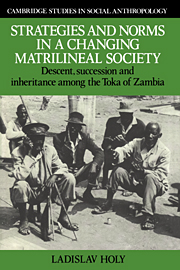 Strategies and Norms in a Changing Matrilineal Society
Strategies and Norms in a Changing Matrilineal Society Published online by Cambridge University Press: 25 August 2009
I have mentioned that in Guta and Cifokoboyo the people collectively referred to as basimukowa are the most important category among one's kin. They are conceptualised as uterine kinsmen, or, more specifically, as descendants in the matrilineal line of a common ancestress. This conceptualisation is sustained because most of them usually do not live further apart than in several neighbouring villages. Being spatially close together, they can attend one another's funerals and final mourning ceremonies, they can inherit one another's property and one of their members can become the deceased's successor and main heir, and they can assemble for the performance of rituals. Because of the spatial distribution of the basimukowa, individual villages can be conceptualised as being owned by particular mikowa, fission of villages can be understood as a territorial expression of mukowa segmentation, succession to village headmanship can be seen as determined by the relations between mukowa and village, and the status of particular residents of the village can be differentiated on the basis of their mukowa membership. A considerable range of actual social transactions can thus be interpreted as being determined or affected by the mukowa membership of their participants. There is either no discrepancy between the notional level and the level of actual social transactions for which the existing notions provide an adequate meaning, or, wherever there is a discrepancy (e.g. the succession of sons to village headmanship), it can still be explained, and thus made meaningful, within the framework of existing notions.
To save this book to your Kindle, first ensure no-reply@cambridge.org is added to your Approved Personal Document E-mail List under your Personal Document Settings on the Manage Your Content and Devices page of your Amazon account. Then enter the ‘name’ part of your Kindle email address below. Find out more about saving to your Kindle.
Note you can select to save to either the @free.kindle.com or @kindle.com variations. ‘@free.kindle.com’ emails are free but can only be saved to your device when it is connected to wi-fi. ‘@kindle.com’ emails can be delivered even when you are not connected to wi-fi, but note that service fees apply.
Find out more about the Kindle Personal Document Service.
To save content items to your account, please confirm that you agree to abide by our usage policies. If this is the first time you use this feature, you will be asked to authorise Cambridge Core to connect with your account. Find out more about saving content to Dropbox.
To save content items to your account, please confirm that you agree to abide by our usage policies. If this is the first time you use this feature, you will be asked to authorise Cambridge Core to connect with your account. Find out more about saving content to Google Drive.